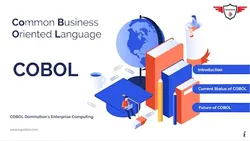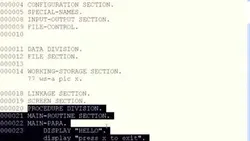
IBM COBOL Basic Testing and Debugging 
This course provides an introduction to IBM COBOL Basic Testing and Debugging. You will learn about common errors associated with working with COBOL, list file status codes, and describe the process of debugging COBOL code. You will gain hands-on experience with IBM COBOL testing and debugging topics and technologies. Enroll now and take the first step towards mastering IBM COBOL Basic Testing and Debugging! ▼
ADVERTISEMENT
Course Feature
![]() Cost:
Cost:
Free
![]() Provider:
Provider:
Coursera
![]() Certificate:
Certificate:
Paid Certification
![]() Language:
Language:
English
![]() Start Date:
Start Date:
22nd May, 2023
Course Overview
❗The content presented here is sourced directly from Coursera platform. For comprehensive course details, including enrollment information, simply click on the 'Go to class' link on our website.
Updated in [May 25th, 2023]
[Why to learn]: IBM COBOL is a powerful programming language used in many industries. It is important to understand the basics of testing and debugging COBOL code in order to ensure that the code is running correctly and efficiently. This course will provide learners with the knowledge and skills to identify and fix errors in COBOL code.
[Development Paths]: After completing this course, learners will be able to identify and debug errors in COBOL code. They will be able to use the IBM COBOL debugging tools to identify and fix errors. They will also be able to use the IBM COBOL testing tools to test the code for accuracy and efficiency.
[Related Learning Suggestions]: Learners who complete this course may want to consider taking additional courses in IBM COBOL, such as IBM COBOL Advanced Testing and Debugging, IBM COBOL Performance Tuning, or IBM COBOL Security. These courses will provide learners with the knowledge and skills to further their understanding of IBM COBOL and its related technologies.
[Applications]
After completing this course, students should be able to apply the knowledge and skills they have acquired to debug and test IBM COBOL code. They should be able to identify common errors and list file status codes. Additionally, they should be able to use the debugging process to identify and resolve errors in their COBOL code.
[Career Paths]
1. COBOL Programmer: COBOL Programmers are responsible for writing, testing, and maintaining COBOL code. They must have a strong understanding of the language and be able to debug and troubleshoot any issues that arise. With the increasing demand for COBOL programming, this job position is expected to grow in the coming years.
2. COBOL Analyst: COBOL Analysts are responsible for analyzing and interpreting COBOL code. They must have a strong understanding of the language and be able to identify any potential issues or errors. This job position is expected to grow in the coming years as more organizations are looking to optimize their COBOL code.
3. COBOL Developer: COBOL Developers are responsible for developing and maintaining COBOL applications. They must have a strong understanding of the language and be able to debug and troubleshoot any issues that arise. With the increasing demand for COBOL development, this job position is expected to grow in the coming years.
4. COBOL Tester: COBOL Testers are responsible for testing and verifying COBOL code. They must have a strong understanding of the language and be able to identify any potential issues or errors. This job position is expected to grow in the coming years as more organizations are looking to ensure the quality of their COBOL code.
[Education Paths]
1. Bachelor of Science in Computer Science: A Bachelor of Science in Computer Science is a four-year degree program that provides students with a comprehensive understanding of computer science principles and technologies. Students learn how to design, develop, and maintain software applications, as well as how to use programming languages such as COBOL. This degree is becoming increasingly popular as the demand for software developers continues to grow.
2. Master of Science in Computer Science: A Master of Science in Computer Science is a two-year degree program that provides students with an advanced understanding of computer science principles and technologies. Students learn how to design, develop, and maintain software applications, as well as how to use programming languages such as COBOL. This degree is becoming increasingly popular as the demand for software developers continues to grow.
3. Master of Business Administration in Information Technology: A Master of Business Administration in Information Technology is a two-year degree program that provides students with an understanding of the business aspects of information technology. Students learn how to manage IT projects, develop IT strategies, and use programming languages such as COBOL. This degree is becoming increasingly popular as the demand for IT professionals continues to grow.
4. Doctor of Philosophy in Computer Science: A Doctor of Philosophy in Computer Science is a four-year degree program that provides students with an in-depth understanding of computer science principles and technologies. Students learn how to design, develop, and maintain software applications, as well as how to use programming languages such as COBOL. This degree is becoming increasingly popular as the demand for software developers continues to grow.
Pros & Cons

Interesting.

None.
Course Provider

Provider Coursera's Stats at AZClass
Discussion and Reviews
0.0 (Based on 0 reviews)
Explore Similar Online Courses

Creating User Experiences Course

Capstone Course: Start Up Your Fintech Future

Python for Informatics: Exploring Information

Social Network Analysis

Introduction to Systematic Review and Meta-Analysis

The Analytics Edge

DCO042 - Python For Informatics

Causal Diagrams: Draw Your Assumptions Before Your Conclusions

Whole genome sequencing of bacterial genomes - tools and applications

Mainframe COBOL Tutorial

COBOL


Start your review of IBM COBOL Basic Testing and Debugging